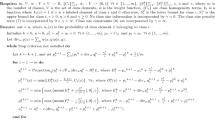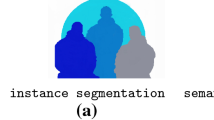Abstract
Graph-based clustering methods are successfully applied to computer vision and machine learning problems. In this paper we demonstrate how to introduce a-priori knowledge on class membership in a systematic and principled way: starting from a convex relaxation of the graph-based clustering problem we integrate information about class membership by adding linear constraints to the resulting semidefinite program. With our method, there is no need to modify the original optimization criterion, ensuring that the algorithm will always converge to a high quality clustering or image segmentation.
Preview
Unable to display preview. Download preview PDF.
Similar content being viewed by others
References
Blum, A., Chawla, S.: Learning from labeled and unlabeled data using graph mincuts. In: ICML, pp. 19–26 (2001)
Weiss, Y.: Segmentation using eigenvectors: A unifying view. In: ICCV, pp. 975–982 (1999)
Shi, J., Malik, J.: Normalized cuts and image segmentation. IEEE PAMI 22(8), 888–905 (2000)
Lanckriet, G., Cristianini, N., Bartlett, P., Ghaoui, L.E., Jordan, M.: Learning the kernel matrix with semi-definite programming. In: ICML, pp. 323–330 (2002)
Keuchel, J., Schnörr, C., Schellewald, C., Cremers, D.: Binary partitioning, perceptual grouping, and restoration with semidefinite programming. IEEE PAMI 25(11), 1364–1379 (2003)
Yu, S.X., Shi, J.: Segmentation given partial grouping constraints. IEEE PAMI 26(2), 173–183 (2004)
Boykov, Y., Jolly, M.-P.: Interactive graph cuts for optimal boundary & region segmentation of objects in n-d images. In: ICCV, vol. 1, pp. 105–112 (2001)
Hermes, L., Buhmann, J.M.: Semi-supervised image segmentation by parametric distributional clustering. In: Rangarajan, A., Figueiredo, M.A.T., Zerubia, J. (eds.) EMMCVPR 2003. LNCS, vol. 2683, pp. 229–245. Springer, Heidelberg (2003)
Nock, R., Nielsen, F.: Grouping with bias revisited. In: CVPR (2004)
Mohar, B., Poljak, S.: Eigenvalues in combinatorial optimization. In: Brualdi, R., Friedland, S., Klee, V. (eds.) Combinatorial and Graph-Theoretical Problems in Linear Algebra. IMA Vol. Math. Appl., vol. 50, pp. 107–151. Springer, Heidelberg (1993)
Perona, P., Freeman, W.: A factorization approach to grouping. In: Burkhardt, H.-J., Neumann, B. (eds.) ECCV 1998. LNCS, vol. 1406, pp. 655–670. Springer, Heidelberg (1998)
Sarkar, S., Soundararajan, P.: Supervised learning of large perceptual organization: Graph spectral partitioning and learning automata. IEEE PAMI 22(5), 504–525 (2000)
Hertz, T., Shental, N., Bar-Hillel, A., Weinshall, D.: Enhancing image and video retrieval: Learning via equivalence constraints. In: CVPR (2003)
Lovász, L., Schrijver, A.: Cones of matrices and set-functions and 0-1 optimization. SIAM J. Optimization 1(2), 166–190 (1991)
Goemans, M., Williamson, D.: Improved approximation algorithms for maximum cut and satisfiability problems using semidefinite programming. J. of the ACM 42(6), 1115–1145 (1995)
Nesterov, Y., Nemirovskii, A.: Interior Point Polynomial Methods in Convex Programming. SIAM, Philadelphia (1994)
Wagstaff, K., Cardie, C., Rogers, S., Schroedl, S.: Constrained k-means clustering with background knowledge. In: ICML, pp. 577–584 (2001)
Rand, W.M.: Objective criteria for the evaluation of clustering methods. J. of the Am. Stat. Assoc. 66(336), 846–850 (1971)
Martin, D., Fowlkes, C., Tal, D., Malik, J.: A database of human segmented natural images and its application to evaluating segmentation algorithms and measuring ecological statistics. In: ICCV, pp. 416–423 (2001)
Comaniciu, D., Meer, P.: Mean shift: A robust approach toward feature space analysis. IEEE PAMI 24(5), 603–619 (2002)
Keuchel, J., Schnörr, C., Heiler, M.: Hierarchical image segmentation based on semidefinite programming. In: Rasmussen, C.E., Bülthoff, H.H., Schölkopf, B., Giese, M.A. (eds.) DAGM 2004. LNCS, vol. 3175, pp. 120–128. Springer, Heidelberg (2004)
Author information
Authors and Affiliations
Editor information
Editors and Affiliations
Rights and permissions
Copyright information
© 2005 Springer-Verlag Berlin Heidelberg
About this paper
Cite this paper
Heiler, M., Keuchel, J., Schnörr, C. (2005). Semidefinite Clustering for Image Segmentation with A-priori Knowledge. In: Kropatsch, W.G., Sablatnig, R., Hanbury, A. (eds) Pattern Recognition. DAGM 2005. Lecture Notes in Computer Science, vol 3663. Springer, Berlin, Heidelberg. https://doi.org/10.1007/11550518_39
Download citation
DOI: https://doi.org/10.1007/11550518_39
Publisher Name: Springer, Berlin, Heidelberg
Print ISBN: 978-3-540-28703-2
Online ISBN: 978-3-540-31942-9
eBook Packages: Computer ScienceComputer Science (R0)




